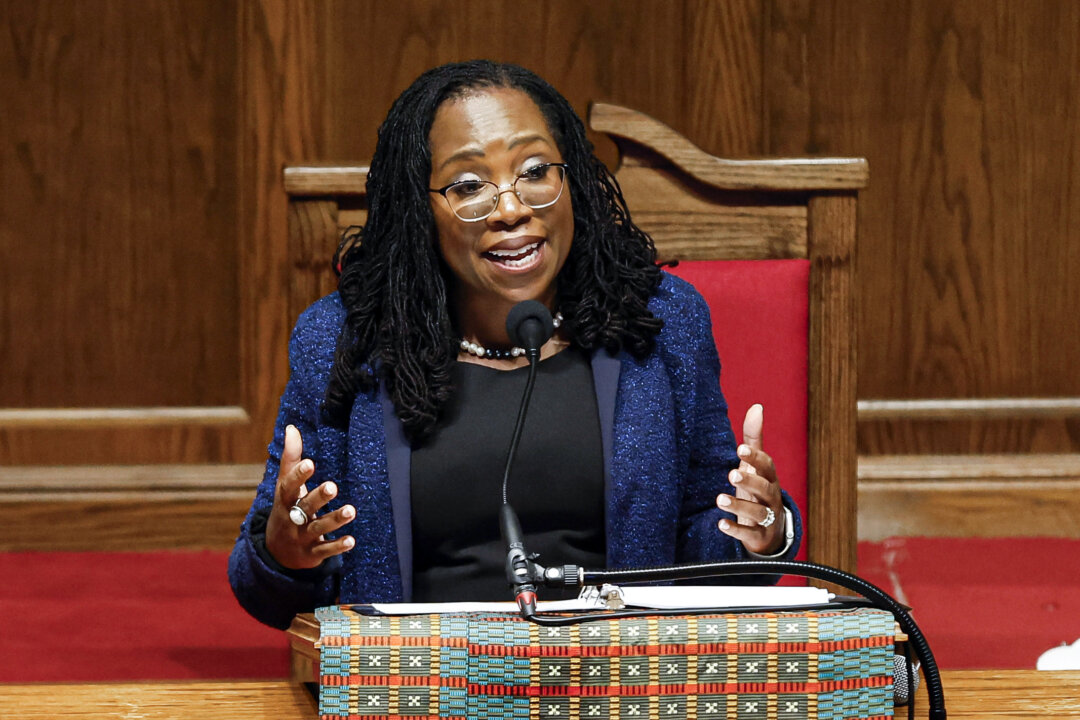The justice did not specifically mention Trump during her speech but spoke about ’the elephant in the room.’
Supreme Court Justice Ketanji Brown Jackson said on May 1 that President Donald Trump’s criticism of some judges seemed “designed to intimidate the judiciary.”
Jackson did not specifically mention Trump during her speech but spoke about “the elephant in the room.”
“The attacks are not random. They seem designed to intimidate those of us who serve in this critical capacity,” Jackson said at the First Circuit Judicial Conference in Rio Grande, Puerto Rico, on May 1.
“The threats and harassment are attacks on our democracy, on our system of government. And they ultimately risk undermining our Constitution and the rule of law.”
Jackson took her seat on the high court in June 2022 after being nominated by President Joe Biden.
Several federal judges have said the Trump administration has not complied with various court orders on federal spending, the firing of government employees, and foreign aid. The administration denies that it disobeyed the orders and has criticized judges who have halted its policy actions, in some cases calling for the judges to be impeached.
Jackson’s comments followed a public statement by Chief Justice John Roberts on March 18 after Trump called for the impeachment of U.S. District Judge James Boasberg, who was confirmed in 2011 after being nominated by President Barack Obama.
Boasberg issued orders forbidding the deportation of alleged Venezuelan gang members under the Alien Enemies Act and then said the Trump administration disobeyed those orders. The Trump administration denies it flouted the orders and said some deportation flights had already left U.S. airspace before the initial written order was issued.
“For more than two centuries, it has been established that impeachment is not an appropriate response to disagreement concerning a judicial decision,” Roberts said in a statement provided to The Epoch Times. “The normal appellate review process exists for that purpose.”
Later that month, Rep. Andy Biggs (R-Ariz.) introduced a resolution in the House to impeach Boasberg.
“We cannot stand by while activist judges who incorrectly believe they have more authority than the duly-elected President of the United States, impose their own political agenda on the American people,” Biggs said in a statement on March 31.
Meanwhile, the Supreme Court is scheduled on May 15 to hear oral arguments on lower court orders blocking Trump’s policy of limiting birthright citizenship for certain individuals.
Trump’s Executive Order 14160, signed on Jan. 20, states that “the Fourteenth Amendment has never been interpreted to extend citizenship universally to everyone born within the United States.”
In the court filings, the Department of Justice did not ask the Supreme Court to rule on the constitutionality of the executive order itself, although it acknowledged that the birthright citizenship question raises “important constitutional questions with major ramifications for securing the border.”
Instead, the department made what it called a “modest” request to contain the coverage of court injunctions within the parties in the lawsuits.
“While the parties litigate weighty questions, the Court should ‘restrict the scope’ of multiple preliminary injunctions that ‘purport to cover every person … in the country,’ limiting those injunctions to parties actually within the courts’ power,” it wrote.
Nationwide injunctions, also known as non-party or universal injunctions, set policy for the entire country. Such injunctions issued by judges have become controversial in recent years as they have become increasingly common.
On April 9, the House passed a bill on a 219–213 vote in an attempt to curb the barrage of district court rulings that have blocked or delayed Trump’s executive actions on multiple fronts.
Wielding national injunctions in that way “undermines the system of government,” the bill’s sponsor, Rep. Darrell Issa (R-Calif.), said on the House floor on April 8.
Sam Dorman contributed to this report.

